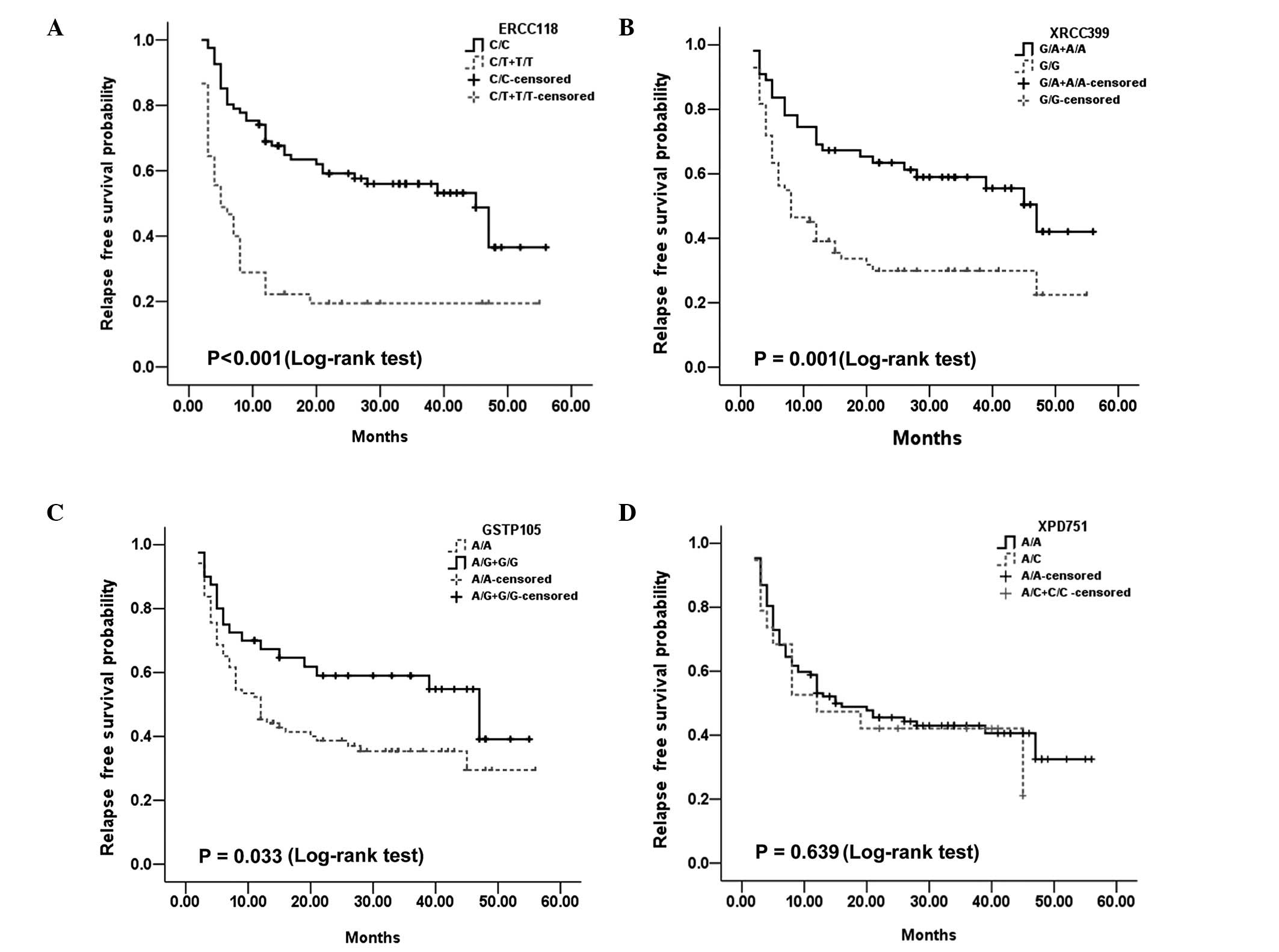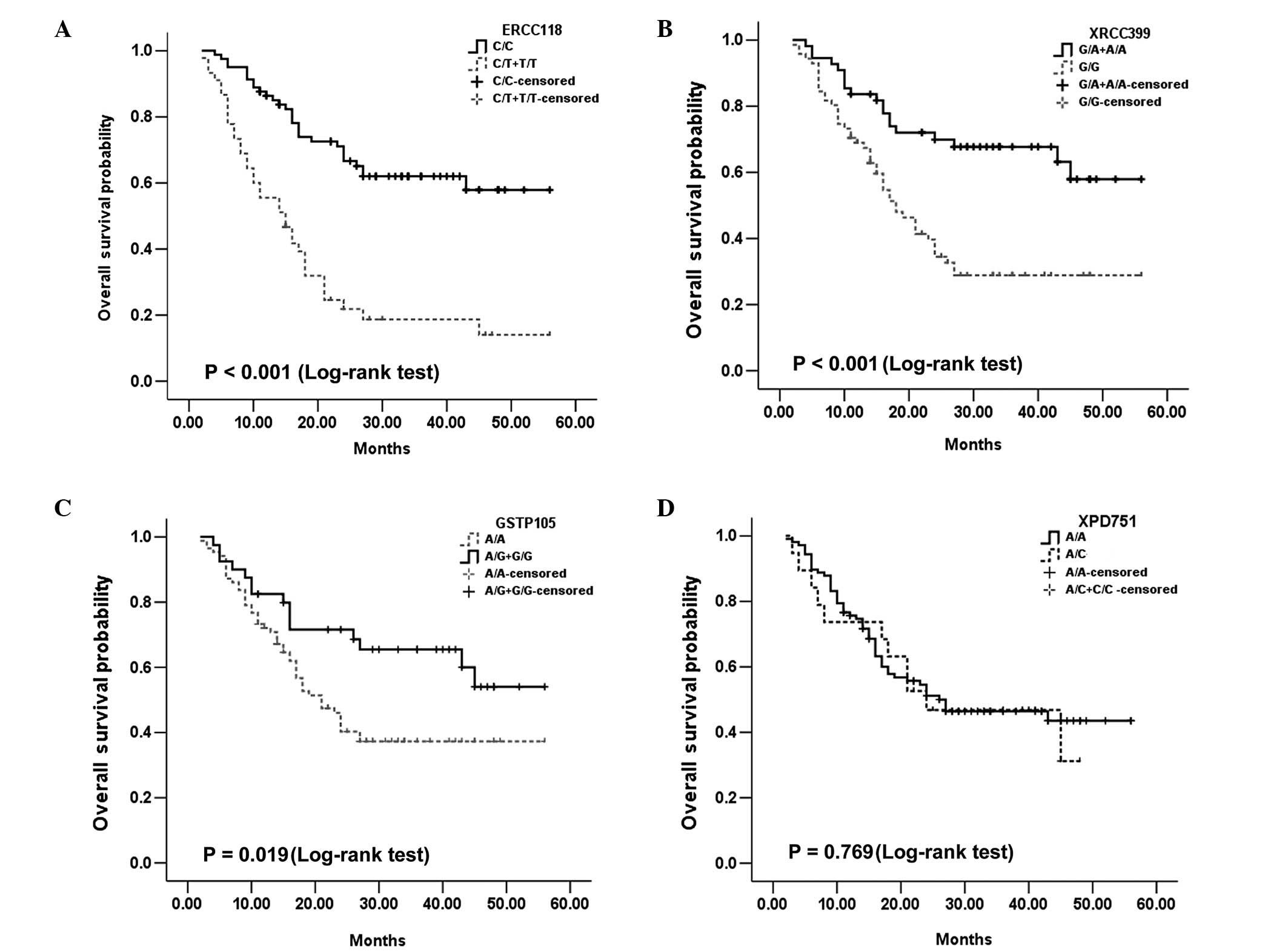|
1
|
Kamangar F, Dores GM and Anderson WF:
Patterns of cancer incidence, mortality, and prevalence across five
continents: defining priorities to reduce cancer disparities in
different geographic regions of the world. J Clin Oncol.
24:2137–2150. 2006. View Article : Google Scholar
|
|
2
|
Leung WK, Wu MS, Kakugawa Y, et al:
Screening for gastric cancer in Asia: current evidence and
practice. Lancet Oncol. 9:279–287. 2008. View Article : Google Scholar : PubMed/NCBI
|
|
3
|
Macdonald JS: Treatment of localized
gastric cancer. Semin Oncol. 31:566–573. 2004. View Article : Google Scholar : PubMed/NCBI
|
|
4
|
Carrato A, Gallego-Plazas J and
Guillen-Ponce C: Adjuvant therapy of resected gastric cancer is
necessary. Semin Oncol. 32:S105–S108. 2005. View Article : Google Scholar : PubMed/NCBI
|
|
5
|
Mamenta EL, Poma EE, Kaufmann WK,
Delmastro DA, Grady HL and Chaney SG: Enhanced replicative bypass
of platinum-DNA adducts in cisplatin-resistant human ovarian
carcinoma cell lines. Cancer Res. 54:3500–3505. 1994.PubMed/NCBI
|
|
6
|
Louvet C, André T, Tigaud JM, et al: Phase
II study of oxaliplatin, fluorouracil, and folinic acid in locally
advanced or metastatic gastric cancer patients. J Clin Oncol.
20:4543–4548. 2002. View Article : Google Scholar : PubMed/NCBI
|
|
7
|
De Vita F, Orditura M, Matano E, et al: A
phase II study of biweekly oxaliplatin plus infusional
5-fluorouracil and folinic acid (FOLFOX-4) as first-line treatment
of advanced gastric cancer patients. Br J Cancer. 92:1644–1649.
2005.PubMed/NCBI
|
|
8
|
Al-Batran SE, Atmaca A, Hegewisch-Becker
S, et al: Phase II trial of biweekly infusional fluorouracil,
folinic acid, and oxaliplatin in patients with advanced gastric
cancer. J Clin Oncol. 22:658–663. 2004. View Article : Google Scholar : PubMed/NCBI
|
|
9
|
Cavanna L, Artioli F, Codignola C, et al:
Oxaliplatin in combination with 5-fluorouracil (5-FU) and
leucovorin (LV) in patients with metastatic gastric cancer (MGC).
Am J Clin Oncol. 29:371–375. 2006. View Article : Google Scholar : PubMed/NCBI
|
|
10
|
Wei Q, Frazier ML and Levin B: DNA repair:
a double-edged sword. J Natl Cancer Inst. 92:440–441. 2000.
View Article : Google Scholar : PubMed/NCBI
|
|
11
|
Reardon JT, Vaisman A, Chaney SG and
Sancar A: Efficient nucleotide excision repair of cisplatin,
oxaliplatin, and Bis-aceto-ammine-dichloro-cyclohexylamine-
platinum(IV) (JM216) platinum intrastrand DNA diadducts. Cancer
Res. 59:3968–3971. 1999.
|
|
12
|
Reed E: Platinum-DNA adduct, nucleotide
excision repair and platinum based anti-cancer chemotherapy. Cancer
Treat Rev. 24:331–344. 1998. View Article : Google Scholar : PubMed/NCBI
|
|
13
|
Goode EL, Ulrich CM and Potter JD:
Polymorphisms in DNA repair genes and associations with cancer
risk. Cancer Epidemiol Biomarkers Prev. 11:1513–1530.
2002.PubMed/NCBI
|
|
14
|
Wood RD, Mitchell M, Sgouros J and Lindahl
T: Human DNA repair genes. Science. 291:1284–1289. 2001. View Article : Google Scholar : PubMed/NCBI
|
|
15
|
Frankmoelle WP, Medina JC, Shan B, Narbut
MR and Beckmann H: Glutathione S-transferase metabolism of the
antineoplastic pentafluorophenylsulfonamide in tissue culture and
mice. Drug Metab Dispos. 28:951–958. 2000.PubMed/NCBI
|
|
16
|
National Cancer Institute. NCI Common
Toxicity Criteria. http://ctep.cancer.gov.
Accessed October 1, 2004
|
|
17
|
Salinas AE and Wong MG: Glutathione
S-transferases - a review. Curr Med Chem. 6:279–309. 1999.
|
|
18
|
Gossage L and Madhusudan S: Cancer
pharmacogenomics: role of DNA repair genetic polymorphisms in
individualizing cancer therapy. Mol Diagn Ther. 11:361–380. 2007.
View Article : Google Scholar : PubMed/NCBI
|
|
19
|
De Silva IU, McHugh PJ, Clingen PH and
Hartley JA: Defining the roles of nucleotide excision repair and
recombination in the repair of DNA interstrand cross-links in
mammalian cells. Mol Cell Biol. 20:7980–7990. 2000.PubMed/NCBI
|
|
20
|
Weberpals J, Garbuio K, O’Brien A, et al:
The DNA repair proteins BRCA1 and ERCC1 as predictive markers in
sporadic ovarian cancer. Int J Cancer. 124:806–815. 2009.
View Article : Google Scholar : PubMed/NCBI
|
|
21
|
Denlinger CS and Cohen SJ: Progress in the
development of prognostic and predictive markers for
gastrointestinal malignancies. Curr Treat Options Oncol. 8:339–351.
2007. View Article : Google Scholar : PubMed/NCBI
|
|
22
|
Iqbal S, Stoehlmacher J and Lenz HJ:
Tailored chemotherapy for colorectal cancer: a new approach to
therapy. Cancer Invest. 22:762–773. 2004. View Article : Google Scholar : PubMed/NCBI
|
|
23
|
Hofler H, Langer R, Ott K and Keller G:
Prediction of response to neoadjuvant chemotherapy in carcinomas of
the upper gastrointestinal tract. Adv Exp Med Biol. 587:115–120.
2006. View Article : Google Scholar : PubMed/NCBI
|
|
24
|
Guichard S, Arnould S, Hennebelle I, Bugat
R and Canal P: Combination of oxaliplatin and irinotecan on human
colon cancer cell lines: activity in vitro and in
vivo. Anticancer Drugs. 12:741–751. 2001. View Article : Google Scholar : PubMed/NCBI
|
|
25
|
Chang PM, Tzeng CH, Chen PM, et al: ERCC1
codon 118 C-->T polymorphism associated with ERCC1 expression
and outcome of FOLFOX-4 treatment in Asian patients with metastatic
colorectal carcinoma. Cancer Sci. 100:278–283. 2009.
|
|
26
|
Kalikaki A, Kanaki M, Vassalou H, et al:
DNA repair gene polymorphisms predict favorable clinical outcome in
advanced non-small-cell lung cancer. Clin Lung Cancer. 10:118–123.
2009. View Article : Google Scholar : PubMed/NCBI
|
|
27
|
Stoehlmacher J, Park DJ, Zhang W, et al: A
multivariate analysis of genomic polymorphisms: prediction of
clinical outcome to 5-FU/oxaliplatin combination chemotherapy in
refractory colorectal cancer. Br J Cancer. 91:344–354. 2004.
|
|
28
|
Ruzzo A, Graziano F, Loupakis F, et al:
Pharmacogenetic profiling in patients with advanced colorectal
cancer treated with first-line FOLFOX-4 chemotherapy. J Clin Oncol.
25:1247–1254. 2007. View Article : Google Scholar : PubMed/NCBI
|
|
29
|
Yu JJ, Lee KB, Mu C, et al: Comparison of
two human ovarian carcinoma cell lines (A2780/CP70 and MCAS) that
are equally resistant to platinum, but differ at codon 118 of the
ERCC1 gene. Int J Oncol. 16:555–560. 2000.PubMed/NCBI
|
|
30
|
Huang MY, Huang ML, Chen MJ, et al:
Multiple genetic polymorphisms in the prediction of clinical
outcome of metastatic colorectal cancer patients treated with
first-line FOLFOX-4 chemotherapy. Pharmacogenet Genomics. 21:18–25.
2011. View Article : Google Scholar
|
|
31
|
Spitz MR, Wu X, Wang Y, et al: Modulation
of nucleotide excision repair capacity by XPD polymorphisms in lung
cancer patients. Cancer Res. 61:1354–1357. 2001.PubMed/NCBI
|
|
32
|
Wolfe KJ, Wickliffe JK, Hill CE, Paolini
M, Ammenheuser MM and Abdel-Rahman SZ: Single nucleotide
polymorphisms of the DNA repair gene XPD/ERCC2 alter mRNA
expression. Pharmacogenet Genomics. 17:897–905. 2007. View Article : Google Scholar : PubMed/NCBI
|
|
33
|
Lunn RM, Helzlsouer KJ, Parshad R, et al:
XPD polymorphisms: effects on DNA repair proficiency.
Carcinogenesis. 21:551–555. 2000. View Article : Google Scholar : PubMed/NCBI
|
|
34
|
Park DJ, Stoehlmacher J, Zhang W, Tsao-Wei
DD, Groshen S and Lenz HJ: A Xeroderma pigmentosum group D gene
polymorphism predicts clinical outcome to platinum-based
chemotherapy in patients with advanced colorectal cancer. Cancer
Res. 61:8654–8658. 2001.
|
|
35
|
Zárate RN, Arias F, Bandres E, Cubedo E,
Malumbres R and García-Foncillas J: Xeroderma pigmentosum group D
751 polymorphism as a predictive factor in resected gastric cancer
treated with chemo-radiotherapy. World J Gastroenterol.
12:6032–6036. 2006.PubMed/NCBI
|
|
36
|
Tibaldi C, Giovannetti E, Vasile E, et al:
Correlation of CDA, ERCC1, and XPD polymorphisms with response and
survival in gemcitabine/cisplatin-treated advanced non-small cell
lung cancer patients. Clin Cancer Res. 14:1797–1803. 2008.
View Article : Google Scholar : PubMed/NCBI
|
|
37
|
Xing D, Tan W, Wei Q and Lin D:
Polymorphisms of the DNA repair gene XPD and risk of lung cancer in
a Chinese population. Lung Cancer. 38:123–129. 2002. View Article : Google Scholar : PubMed/NCBI
|
|
38
|
Liu B, Wei J, Zou Z, et al: Polymorphism
of XRCC1 predicts overall survival of gastric cancer patients
receiving oxaliplatin-based chemotherapy in Chinese population. Eur
J Hum Genet. 15:1049–1053. 2007. View Article : Google Scholar
|
|
39
|
Vodicka P, Kumar R, Stetina R, et al:
Genetic polymorphisms in DNA repair genes and possible links with
DNA repair rates, chromosomal aberrations and single-strand breaks
in DNA. Carcinogenesis. 25:757–763. 2004. View Article : Google Scholar : PubMed/NCBI
|
|
40
|
Vodicka P, Stetina R, Polakova V, et al:
Association of DNA repair polymorphisms with DNA repair functional
outcomes in healthy human subjects. Carcinogenesis. 28:657–664.
2007. View Article : Google Scholar : PubMed/NCBI
|
|
41
|
Pacetti P, Giovannetti E, Mambrini A, et
al: Single nucleotide polymorphisms and clinical outcome in
patients with biliary tract carcinoma treated with epirubicin,
cisplatin and capecitabine. Anticancer Res. 29:1835–1840. 2009.
|
|
42
|
Giachino DF, Ghio P, Regazzoni S, et al:
Prospective assessment of XPD Lys751Gln and XRCC1 Arg399Gln single
nucleotide polymorphisms in lung cancer. Clin Cancer Res.
13:2876–2881. 2007. View Article : Google Scholar : PubMed/NCBI
|
|
43
|
Moreno V, Gemignani F, Landi S, et al:
Polymorphisms in genes of nucleotide and base excision repair: risk
and prognosis of colorectal cancer. Clin Cancer Res. 12:2101–2108.
2006. View Article : Google Scholar : PubMed/NCBI
|
|
44
|
Suh KW, Kim JH, Kim do Y, Kim YB, Lee C
and Choi S: Which gene is a dominant predictor of response during
FOLFOX chemotherapy for the treatment of metastatic colorectal
cancer, the MTHFR or XRCC1 gene? Ann Surg Oncol. 13:1379–1385.
2006. View Article : Google Scholar : PubMed/NCBI
|
|
45
|
de las Peñas R, Sanchez-Ronco M, Alberola
V, et al: Polymorphisms in DNA repair genes modulate survival in
cisplatin/gemcitabine-treated non-small-cell lung cancer patients.
Ann Oncol. 17:668–675. 2006.PubMed/NCBI
|
|
46
|
Bewick MA, Conlon MS and Lafrenie RM:
Polymorphisms in XRCC1, XRCC3, and CCND1 and survival after
treatment for metastatic breast cancer. J Clin Oncol. 24:5645–5651.
2006. View Article : Google Scholar : PubMed/NCBI
|
|
47
|
Yoon HH, Catalano PJ, Murphy KM, et al:
Genetic variation in DNA-repair pathways and response to
radiochemotherapy in esophageal adenocarcinoma: a retrospective
cohort study of the Eastern Cooperative Oncology Group. BMC Cancer.
11:1762011. View Article : Google Scholar
|
|
48
|
Cheng XD, Lu WG, Ye F, Wan XY and Xie X:
The association of XRCC1 gene single nucleotide polymorphisms with
response to neoadjuvant chemotherapy in locally advanced cervical
carcinoma. J Exp Clin Cancer Res. 28:912009. View Article : Google Scholar : PubMed/NCBI
|
|
49
|
Huang ZH, Hua D and Du X: Polymorphisms in
p53, GSTP1 and XRCC1 predict relapse and survival of gastric cancer
patients treated with oxaliplatin-based adjuvant chemotherapy.
Cancer Chemother Pharmacol. 64:1001–1007. 2009. View Article : Google Scholar : PubMed/NCBI
|
|
50
|
Goekkurt E, Al-Batran SE, Hartmann JT, et
al: Pharmacogenetic analyses of a phase III trial in metastatic
gastroesophageal adenocarcinoma with fluorouracil and leucovorin
plus either oxaliplatin or cisplatin: a study of the
arbeitsgemeinschaft internistische onkologie. J Clin Oncol.
27:2863–2873. 2009. View Article : Google Scholar
|
|
51
|
Kweekel DM, Koopman M, Antonini NF, et al:
GSTP1 Ile105Val polymorphism correlates with progression-free
survival in MCRC patients treated with or without irinotecan: a
study of the Dutch Colorectal Cancer Group. Br J Cancer.
99:1316–1321. 2008. View Article : Google Scholar : PubMed/NCBI
|
|
52
|
Stoehlmacher J, Park DJ, Zhang W, et al:
Association between glutathione S-transferase P1, T1, and M1
genetic polymorphism and survival of patients with metastatic
colorectal cancer. J Natl Cancer Inst. 94:936–942. 2002. View Article : Google Scholar : PubMed/NCBI
|
















